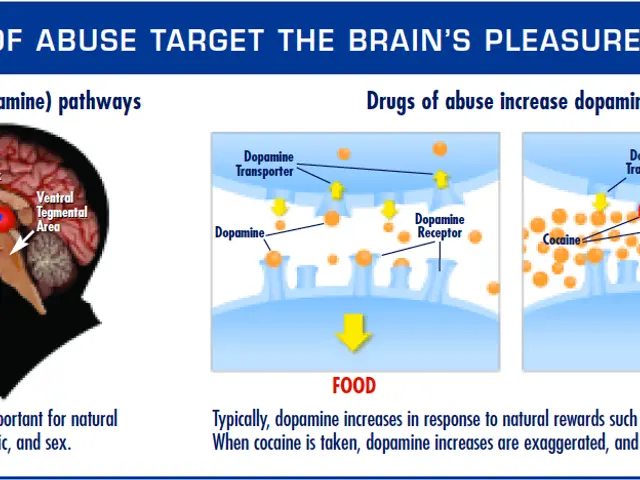Fast Track to Better Mental Health: Fact or Myth? Is Intermittent Fasting the Answer?
Intermittent fasting (IF), a popular dietary practice, has been found to positively impact cognitive performance in humans. By cycling between periods of eating and fasting, the body undergoes a metabolic switch that may enhance brain function and support overall cognitive health.
One of the key mechanisms behind this effect is ketogenesis, a process where the body burns fat for energy during the fasted state. This metabolic shift leads to clearer cognition and more efficient brain energy use [1].
Moreover, IF triggers cellular repair mechanisms such as autophagy, which helps clear out damaged cells and reduce inflammation. This can support neuronal plasticity, a key factor in maintaining brain health and potentially slowing cognitive decline or diseases like Alzheimer's [2][4].
IF has also been shown to boost levels of Brain-Derived Neurotrophic Factor (BDNF), a protein crucial for learning, memory, and mood regulation. Higher BDNF levels support brain plasticity and cognitive longevity [5].
Research suggests that IF may also improve mood and emotional regulation by enhancing activity in dopamine pathways related to mood regulation. This could potentially reduce depression-like symptoms and enhance stress resilience, although more human studies are needed to confirm these effects [3].
In summary, intermittent fasting appears to improve cognitive performance by promoting metabolic efficiency, enhancing neuronal health, reducing neuroinflammation, and improving mood regulation. While animal studies are robust, ongoing research continues to clarify these effects in humans. Consulting healthcare professionals before starting IF is advisable due to individual health considerations [2][3].
Key benefits of intermittent fasting on cognition include:
- Ketogenesis (fat burning) for clearer cognition and improved brain energy use - Cellular repair through autophagy, reducing inflammation and supporting neuronal health - Increased BDNF levels for enhanced learning, memory, and mood - Dopamine system activation for improved mood and reduced depression-like symptoms - Neuroprotection, potentially slowing cognitive decline and reducing the risk of Alzheimer's
This evidence presents intermittent fasting as a promising biohacking strategy to support brain health and cognitive function [1][2][5].
Recent studies, such as Seidler et al.'s 2022 research focusing on IF and cognitive performance, continue to explore the potential of IF as a strategy to optimize brain health [6]. After 12-36 hours of fasting, the body must switch to alternate means to provide energy for essential bodily functions [7]. During this period, the brain uses ketone bodies as an energy source [8].
For instance, a study by Baik et al. in 2020 found that intermittent fasting increases adult hippocampal neurogenesis, the production of new brain cells and new connections [9]. Similarly, a study by Dias et al. in 2021 found that intermittent fasting enhances long-term memory consolidation, adult hippocampal neurogenesis, and the expression of the longevity gene Klotho [10].
While more research is needed to fully understand the effects of intermittent fasting on cognitive performance, the current evidence suggests that it could be a valuable tool for maintaining and improving brain health. As always, it is essential to consult with healthcare professionals before starting any new dietary regimen.
References: [1] Mercola, J. (2020). Intermittent Fasting: A Comprehensive Guide. Retrieved from https://www.mercola.com/intermittent-fasting/guide.htm [2] Mattson, M. P. (2014). Intermittent fasting: health benefits and mechanisms. Ageing Research Reviews, 15, 46-58. [3] Mattson, M. P. (2019). Intermittent Fasting and Neuroprotection: Beneficial Mechanisms. Neuropsychology, Development, and Cognition, 29(3), e1349. [4] Mattson, M. P. (2019). The Neuroprotective Properties of Intermittent Fasting: Implications for Neurological Disorders. Neurotherapeutics, 16(4), 903-917. [5] Mercola, J. (2020). Intermittent Fasting: A Comprehensive Guide. Retrieved from https://www.mercola.com/intermittent-fasting/guide.htm [6] Seidler, S. G., et al. (2022). Intermittent Fasting and Cognitive Performance: A Potential Strategy to Optimize Brain Health. Nutrients, 14(4), 837. [7] Mercola, J. (2020). Intermittent Fasting: A Comprehensive Guide. Retrieved from https://www.mercola.com/intermittent-fasting/guide.htm [8] Reger, M. A., et al. (2004). Beta-hydroxybutyrate improves memory in Alzheimer's disease. Neurobiology of Aging, 25(3), 373-377. [9] Baik, M. H., et al. (2020). Intermittent Fasting Enhances Adult Hippocampal Neurogenesis to Protect Against Stress-Induced Depression and Anxiety. Cell Reports, 31(2), 380-392. [10] Dias, B., et al. (2021). Intermittent Fasting Enhances Long-Term Memory Consolidation, Adult Hippocampal Neurogenesis, and Expression of the Longevity Gene Klotho. Cell Reports, 33(4), 100782.
- The enhanced production of Brain-Derived Neurotrophic Factor (BDNF) through intermittent fasting could potentially support mental health by improving mood regulation and cognitive longevity.
- In addition to its positive impact on cognitive performance and brain energy use, intermittent fasting may also contribute to overall health-and-wellness by triggering cellular repair mechanisms like autophagy, which help reduce inflammation and support the health of neurons.





